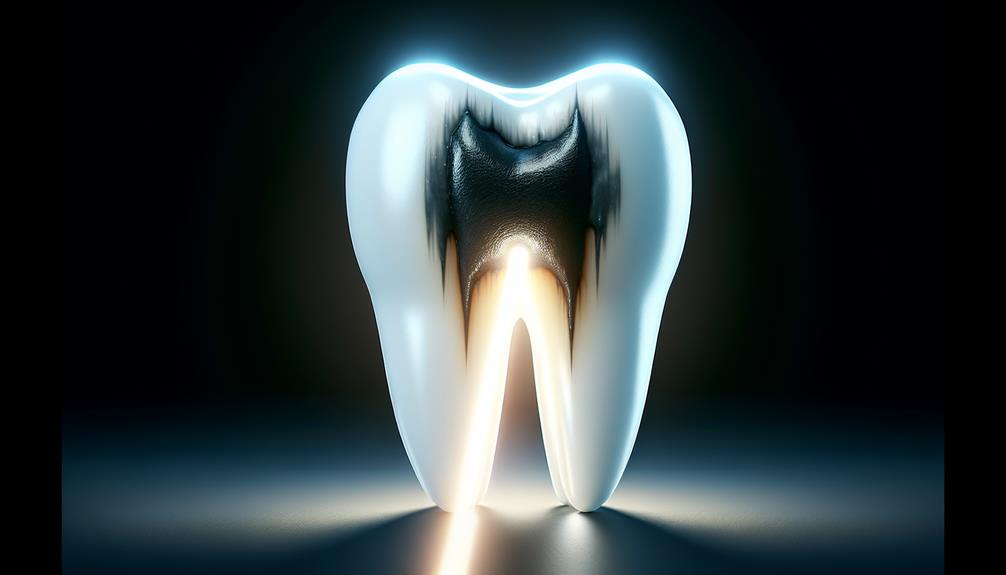When contemplating teeth whitening, be mindful that bleaching agents could weaken your enamel, potentially exacerbating cavities. The erosion of enamel from these agents may heighten your risk of decay and sensitivity. It is vital to address any existing cavities before proceeding with whitening treatments. Careful monitoring and professional evaluation are essential to managing these potential risks effectively.
Key Points
- Whitening can exacerbate existing cavities.
- Bleaching agents may lead to enamel erosion.
- Increased sensitivity can affect oral hygiene.
- Monitor cavities post-whitening for worsening.
- Regular dental check-ups are crucial for cavity detection.
Impact on Enamel Health
When considering the impact of teeth whitening on enamel health, it's important to understand the potential risks associated with this cosmetic procedure. While teeth whitening can enhance the aesthetics of your smile, it's vital to prioritize enamel protection throughout the process.
Enamel, the outer layer of your teeth, acts as a barrier against decay and damage. Whitening products contain bleaching agents that can potentially weaken the enamel if not used properly. To mitigate these risks, incorporating a diligent maintenance routine is key.
A robust enamel protection strategy involves selecting reputable whitening products and following the instructions diligently. Additionally, maintaining a consistent oral hygiene routine, including regular brushing with fluoride toothpaste and flossing, can support enamel health. Dentists often recommend using desensitizing toothpaste to alleviate any sensitivity that may arise from whitening treatments.
Sensitivity Concerns
To address sensitivity concerns related to teeth whitening, it's essential to understand the potential impact on your dental health and comfort. Before undergoing a teeth whitening procedure, a pre-whitening evaluation by a dental professional is important. This evaluation helps identify any existing dental issues that could be exacerbated by the whitening process, such as cavities or gum recession, which can lead to increased sensitivity.
During the whitening process, the bleaching agents used can temporarily weaken the enamel, making your teeth more susceptible to sensitivity. It's important to make sure that proper enamel protection methods are employed during the procedure to minimize this risk. Enamel protection techniques, such as the use of desensitizing agents or fluoride treatments, can help safeguard your teeth during and after the whitening process.
Prolonged Teeth Whitening Effects
Considering the potential impact on your dental health and comfort during teeth whitening, it's important to understand the significant effects that may result from the treatment. Whitening maintenance plays a vital role in determining the long-term outcomes of your whitening procedure. Failure to adhere to proper aftercare can lead to issues such as uneven whitening results, teeth sensitivity, and a shortened duration of the whitening effects.
To maintain the results of your teeth whitening treatment, it's essential to follow the guidelines provided by your dentist or oral healthcare professional. These guidelines often include avoiding certain foods and beverages that can stain your teeth, using touch-up whitening products as recommended, and attending regular dental check-ups.
Neglecting whitening maintenance can result in the reoccurrence of stains and discoloration, reducing the longevity of your whitening effects. By being diligent in caring for your teeth post-whitening, you can extend the duration of your bright smile and minimize the need for additional whitening treatments.
Risk of Increased Decay
Increasing the risk of decay, teeth whitening procedures can potentially exacerbate existing cavities if not managed carefully. The bleaching agents used in teeth whitening can lead to enamel erosion, which weakens the protective outer layer of the teeth. When enamel erodes, it exposes the underlying dentin, making teeth more susceptible to cavity progression. If there are hidden cavities or early signs of decay present before whitening, the process can worsen these issues by allowing the bleaching agents to penetrate deeper into the tooth structure.
Moreover, teeth whitening can temporarily increase tooth sensitivity, which may make it challenging to maintain proper oral hygiene practices such as brushing and flossing. Inadequate oral hygiene can further contribute to cavity formation and progression. Hence, it's important to address any existing cavities before undergoing teeth whitening to prevent the risk of increased decay. Regular dental check-ups and consultations with a dentist can help in identifying and treating cavities promptly, ensuring the overall health of your teeth.
Monitoring Cavities Post-Whitening
After undergoing teeth whitening, it's essential to closely monitor any existing cavities for potential worsening or new decay formation. Cavity detection is vital post-whitening as the process can sometimes cause sensitivity, making it difficult to differentiate between normal post-whitening sensitivity and cavity-related pain.
Regular dental check-ups are indispensable for monitoring cavities. Dentists can assess the status of existing cavities and identify any new decay that may have developed after whitening. During these check-ups, dentists may use tools like X-rays to detect cavities that aren't visible to the naked eye, ensuring early intervention and prevention of further damage.
It's recommended to maintain good oral hygiene practices and attend dental check-ups at least twice a year to monitor the status of cavities and address any issues promptly. By staying vigilant about cavity detection and attending routine dental check-ups, you can safeguard your oral health post-teeth whitening.
Frequently Asked Questions
Can Teeth Whitening Treatments Actually Cause Cavities to Develop?
When you whiten your teeth, it's like polishing a diamond – enhancing its brilliance. However, excessive bleaching can weaken enamel, leading to sensitivity and potential damage. Prioritize dental health by consulting professionals.
Is It Possible for Teeth Whitening to Make Existing Cavities Worse?
To prevent exacerbating current cavities, consult a dentist before whitening. Professional guidance guarantees enamel protection and cavity prevention during treatment. Prioritize oral health by seeking expert direction for best results and maintaining a healthy smile.
How Long Do the Effects of Teeth Whitening Treatments Typically Last?
When you whiten your teeth, it's like giving them a fresh coat of paint. The effects typically last from a few months to a year depending on maintenance tips, diet choices, and oral hygiene habits.
Are There Any Specific Factors That Can Increase the Risk of Decay After Teeth Whitening?
To maintain oral health post-teeth whitening, focus on preventive measures. Good dental hygiene habits, like regular brushing, flossing, and dental check-ups, can help prevent decay. Consult your dentist for personalized advice on protecting your teeth.
How Often Should Cavity Monitoring Appointments Be Scheduled After Undergoing Teeth Whitening?
After teeth whitening, prioritize cavity prevention. Schedule post-whitening checkups every six months for best monitoring. Consistent dental visits aid in early detection and treatment of any emerging issues, ensuring your oral health remains in top condition.



